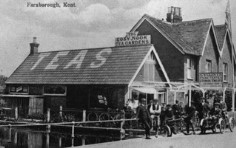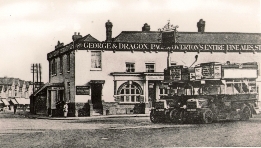


FARNBORUGH LODGE - HENRY WILSON
Farnborough Lodge was owned by Henry Wilson from c. 1885 until his death in 1907. There he researched and transcribed the Farnborough Church Registers (he being the first to do so) and his book was published in 1904. Henry and his wife are buried in St Giles The Abbot Churchyard Farnborough, Kent and the grave can be found near the March family bronze "Fallen Angel" memorial.
Henry Wilson was born at Banks Hall, near Barnsley, Yorkshire on August 1st 1831; the eldest son of Thomas Wilson M.A.. He was educated privately and at St. Catherine's College, Cambridge; M. A. Cambs. Heerved thirty-two years in the 2nd Volunteer Battalion of the Worcester Regiment attaining the rank of Lieutenant Colonel and retired in 1892 receiving the Volunteer Decoration.
He was a Fellow of the Society of Antiquaries; Chief Consul of Kent, Cyclist Touring Club; Freemason, Past Master, Royds Lodge 1202; Past Master, Mark Lodge; Past Principle Royal Arch Chapter; Past Commander Ark Lodge; Past Preceptor Knights Templars; Past Most Wtse Sovereign, Rose Croix Chapter; Past Provincial Grand Warden Craft and ditto Mark; Past Rrovincial Grand J. Royal Arch; Past Grand Senior Deacon of England, Mark.
 |
 |
|
Henry and Mary Wilson of Farnborough Lodge |
Pan Anglican Conference 1908 Kenneth Wilson 3rd from left in 2nd row from front (big white beard and light suit) |
The inscription on the stone cross reads as follows
In Loving Memory of HENRY WILSON OF FARNBOROUGH LODGE ELDEST SONE OF THOMAS WILSON OF BANKS HALL BARNSLEY BORN AUGUST 1831 DIED 8TH JANUARY 1907 ALSO MARY WIFE OF THE ABOVE BORN 20TH APRIL 1832 DIED 271'H NOVEMBER 1920 AND THEIR GRANDSON NEVILLE INCHBALD WILSON M.C.LIEUT. ROYAL WELCH FUSILIERS KILLED IN ACTION AT AVELUY WOOD 6TH APRIL 1918 AGED 25 YEARS |
Henry Wilson was for many years a Sidesman In St. Giles also the Editor of the Farnborough Parochial Magazine.
Alan Robinson
The Church and the Poor
Canon Gregory Smith has brought up an important subject. But to begin with I object to talking of the "duty of the Church". Most people when they use those abstraction "The Church" & "The State" think vaguely of some entity apart from the men & women of the country, somehow superior in wisdom & possessing funds deistinct from the money in individua} pockets.On the contary, so far as these phrases mean corporate action, it is well known that the corporate action of any hundred men is inferior, mentally & morally to the average action of the same men acting individually. Also they have no funds but what they have taken, often unjustly, from individuals.
As Canon Smith says, the great evil now is dealing with questions collectively. I am quite ready to take advice as to what is my individual duty to any individual brought to my notice. Again I dislike the term "the Poor" which is in the same way vaguely taken to imply that it is one of the laws of the universe that there must always be a large number of people living in starvation & misery.
Mr Devas, a Roman Catholic economist lately deceased, laid it down that one rich man implied of necessity 500 poor ones, that there could not possibly be more than a small proportion of well-to-do people in a community. Ruskin put the same doctrine in this form, i.e. The value of the guinea in my pocket varies directly as the absence of a guinea in some one else's pocket. Now I am one of those belated beings, out of touch with the spirit of the age called orthodox economists. We are told that we reason a priori and that socialits are the historical school who base their arguments on facts.
Of course the truth is just the opposite. I have dealt for many years with tradesmen. Butcher, baker, grocer, etc., of each of whom I know that their income is two or three times my own, & yet I get the same attention and good service as if it were the other way. Thackeray describes Major Pendennis going into the parlour of his Bank to shake hands with the partners, explaining thay are just as glad to have his small account as that of a rich man. Nay, even of domestic service. The same truthful writer makes the Major's valet a richer man than his master, yet serving him faithfully for years.
We all of us have known similar cases in our own experience, cases which, if not exceptional as far as regards opportunity, but only as regards taking advantage of opportunity. It is the fashion today that people crowd into the towns because there is no opening to rise in rural life. Though I have been in every county in England I do not know a parish where there is not one or more men who have risen from the position of a labourer to one of independence, as a small farmer, wheelwright, carman & so on.
We ought all to be rendering services to others & deriving our living from the return they make, at a rate settled between them and us not by some outside authority. If we spent less than we receive & provide by saving or insurance for the future, & do not marry until we have done so, why should not everyone be in comfort? It is our duty to do so.
Our first duty & so far as the duty of the church means the duty of her preachers, they would do far more good by inculcating this duty than by urging the duty of almsgiving. Everyone who neglects to of unemployment. It increases the cost of everything, for the things sold must pay for those unsold, & men spend years learning to make, say, crinoliine hoops & then find their craft useless when they are too old to learn a new one.
Henry Wilson, Farnborough, Kent.
LOCKSBOTTOM
Farnborough Lodge
Farnborough Lodge, which is situated at Locks Bottom, Farnborough, Kent.
was built in the early part of the 17th æntury, and was known as Chalk
Farm. Around 1780 it was purchased by Mr. Harrison, at whose death it
passed on to his niece, Mrs Wilson, grandmother of the late Colonel H.
Wilson, who leased it to one General Floyd, who later became Sir John
Floyd, whose daughter married Sir John Peel.
Another who resided here while his own residence, High Elms, was being built, was Sir John William Lubbock, grandfather of Lord Avebury. It was also in the nearby woods of this area that John Evelyn, was held up by highwaymen and robbed, and was tied to a tree, during a journey he made from Tunbridge Wells to Deptford, as described in "Kent Biographies" Edited by Messr's; Pike & Co 1904.

Henry Wilson (or Kenneth?) with beard Aunt Marg in window Edith Wilson on right Neville Wilson on ground
Census. 1885 Occupants of Farnborough Lodge Henry Wilson Born 1831 Married S.Mary B.Custard 1863 died 1907 Mary Wilson Born 1832 lived in Farnborough Lodge until 1913/4 when she moved with her daughter Edith Vaux Wilson to "Eastnod' (now 282 Tubbenden Lane South. Edith was bom1872 and died 1949
Henry and Mary had a son Harold Inchbald Wilson who married Helen Mary Jessop and they had a son Neville Inchbald Wilson in 1892. He was killed in action in France in 1917.
Henry Wilson's father was Thomas Wilson b 1800 d. 1876 who married Elizabeth Inchbald b. 1794 d. 1878 and they had six children

"Eastnor"
"Eastnor" Tubbenden Lane, Farnborough, was the house where Mary Wilson and her daughter Edith Vaux Wilson lived after they left Farnborough Lodge in 1914 until Mary's death in 1920. Edith continued yo live with her friend Katherine Blandford until 1938/9.
"Eastnor" is now just 238 Tubbenden Lane South
Another who resided here while his own residence, High Elms, was being built, was Sir John William Lubbock, grandfather of Lord Avebury. It was also in the nearby woods of this area that John Evelyn, was held up by highwaymen and robbed, and was tied to a tree, during a journey he made from Tunbridge Wells to Deptford, as described in "Kent Biographies" Edited by Messr's; Pike & Co 1904.

Henry Wilson (or Kenneth?) with beard Aunt Marg in window Edith Wilson on right Neville Wilson on ground
Census. 1885 Occupants of Farnborough Lodge Henry Wilson Born 1831 Married S.Mary B.Custard 1863 died 1907 Mary Wilson Born 1832 lived in Farnborough Lodge until 1913/4 when she moved with her daughter Edith Vaux Wilson to "Eastnod' (now 282 Tubbenden Lane South. Edith was bom1872 and died 1949
Henry and Mary had a son Harold Inchbald Wilson who married Helen Mary Jessop and they had a son Neville Inchbald Wilson in 1892. He was killed in action in France in 1917.
Henry Wilson's father was Thomas Wilson b 1800 d. 1876 who married Elizabeth Inchbald b. 1794 d. 1878 and they had six children

"Eastnor"
"Eastnor" Tubbenden Lane, Farnborough, was the house where Mary Wilson and her daughter Edith Vaux Wilson lived after they left Farnborough Lodge in 1914 until Mary's death in 1920. Edith continued yo live with her friend Katherine Blandford until 1938/9.
"Eastnor" is now just 238 Tubbenden Lane South
